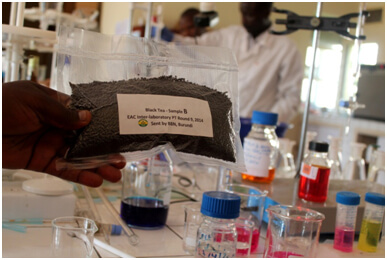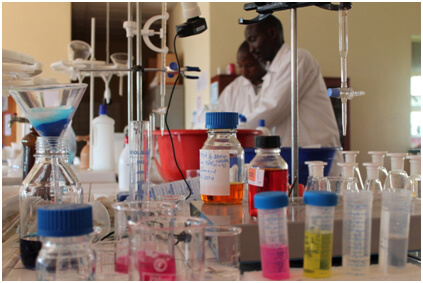Slowly, but perceptibly, sediment forms out of a white substance and gathers at the bottom of a test tube in a small laboratory off the main road in Bujumbura. The sediment’s name is fraud.
“What you are seeing is the analysis of a milk sample we took from a street vendor,” says laboratory assistant Benoit Glaud. “It’s been diluted with flour and with water, which is no surprise to us. Basically, Burundians are victims of massive fraud in foodstuffs.
Glaud is a consultant working to modernize the tools and methods of the Burundi Bureau of Standards and Quality Control (BBN) to help exporters compete in the East African Community (EAC) market and to accustom producers and consumers to the idea that standards are not an extra tax but a guarantee of quality and safety.
“Having the BBN stamp on your product is vital for the free movement of goods within the (East African) community,” says Damien Nakobedetse, BBN’s Director-General.
“Without laboratory test results and the BBN stamp, it is very difficult to sell a product beyond the local market. Without certification, many countries will refuse imports or demand further analysis, which is expensive.”

BBN has been around for two decades but its mission gained added urgency with membership of the EAC and the need for strict standards in the emerging single customs area the bloc is establishing. It was a case of standardize to survive.
Across the community, TradeMark Africa (TMA) is helping national standards offices modernize, develop and introduce guidelines for standards to ease trade between partners and, more importantly, to win acceptance in export markets.
“Trading standards are vital to integration,” says Jose Maciel, Regional Trade and Integration Director of TradeMark Africa. “They can cut the cost of doing business by huge amounts and are central to the future wealth of the EAC.”
In the first instance, TMA is helping national partners, such as BBN, harmonize the standards of the most commonly traded goods in the region so that they can cross borders unimpeded by questions about authenticity or reliability or origin.
In 2012/13, 74 standards were harmonized in the EAC, of which 41 were gazetted as EAC standards. These included the vital sector of edible oils, which alone accounts for trade worth $2 billion every year.

The BBN stamp of approval is seen by many industries as a vital part of the export paperwork and one that has to be earned in the laboratory, not bought in an office with a bribe, as in the past, BBN officials say.
“Already some products certified by BBN are exported in the EAC and other African countries – bottled water for example. With TMA’s help upgrading our laboratories, BBN is more and more able to test and certify products such as medicinal items, juices and sauces,” Nakobedetse says.
Heimo Vicens is the Managing Director of Liquids SPRL, which makes Aquavie sparkling mineral water and fruit juices and sells about three million litres of it a year, starting exports soon. He is adamant that all exporters in Burundi should welcome standards.
Until recently, it sent its products to Kenya for testing in high-tech laboratories there, but the advent of upgraded facilities at BBN means that it could be done locally.
“BBN is an independent public office, and people should have confidence in it. Exporters are learning, but the public needs to learn too that what they consume needs to be tested and standardized,” he says.
Part of the laboratory’s work is just that – sensitizing people about what they consume because fraud is widespread and everyday items like vinegar, oil, milk and sugar are routinely contaminated with substances to maximize street level returns.
BBN has distributed flyers throughout Bujumbura to advise the public that only about half of the milk they buy is pure. The rest has additives or has been watered down, and much is also true of sugar, some of which contains gelatin and artificial sweetener.
It’s not just a case of making goods for sale go further, either. Benoit’s team discovered that a great deal of salt sold in Burundi lacks iodine, a vital ingredient for heath that is routine added in all other countries to ensure adequate iodine intake.
“Iodine is vital for intellectual growth and development and it helps prevent thyroid problems and goiters too. That’s why it’s added to something people consume every day,” says Glaud.
“Our lab worked out that 56% of Burundi’s salts imports contained level of iodine well below levels recommended by UNICEF, and some contained none at all, even though the bags in which it was packed said iodised salt.”
In January, a consignment of 96 tonnes of salt was stopped at Bujumbura port because it had no iodine. “It was all over the news,” says Glaud. “It was a good way of sensitizing people to be careful about what they consume. But how much didn’t we or don’t we catch? That’s a key question. “















